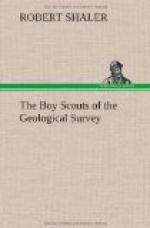“Dad used to say—–and I guess he believed it, too—–that iron in paying quantities lies just beneath the stones of our little farm,” mused Ralph. “We might become rich, mother and I, if we could only get money enough to open up our mine.”
One of the eagles, rare birds in that part of the Country, evidently alarmed or annoyed at the approach of some intruder on their domain, some animal or human being Unseen by Ralph, thrust out its head, opened its beak, and uttered a harsh shrill cry; at which its mate walked forward to the very edge of the crag, poised there for an instant, and then, spreading wide wings, launched itself into the air and sailed swiftly out of sight. It returned, however, in a few minutes and rejoined its mate on the ledge of rock.
“Old King Eagle,” called Ralph, whimsically, knowing well that his voice would not carry above the roar of the brook, “I wish you’d tell me where you get all your gold! I believe I’d go digging with my finger-nails this morning if I only knew where to begin!”
As if in answer to his appeal, one golden feather drifted down and lay glittering iridescently among the pebbles at his feet.
The lad sprang up with a laugh; then, going down on his knees, he began to dig at the exact spot on which the feather fell. Imagination had carried him for the moment to a point of almost superstitious energy. But the spell passed quickly. With a scornful laugh, he straightened his lanky form to its full height.
“Gee!” he exclaimed aloud. “I never supposed I could be such a fool!”
A low laugh sounded behind him, startlingly near, and, turning to glance over his shoulder, he beheld a tall, lean, swarthy young man dressed in a faded and soiled brown suit, with a soft felt hat pulled down over his eyes, and leggings like those often worn by woodsmen.
“Seven kinds of a young fool, eh?” remarked the stranger, shifting a long-handled axe and a heavy wooden mallet which he carried from his shoulder to the ground. “Well, you ain’t no fool, boy, an’ I know it, an’ that’s why I follered you up this trail. I want ter have a little confab with you to-day. Know who I am?”
“No, I don’t know you,” Ralph replied truthfully, “and I can’t guess how you knew I was up here in the hills.”
“Your ma told me. I stopped at your shack, about two hours ago, an’ she told me you was out lookin’ after your traps. Any luck?”
“Not much.” Ralph did not wish the man to observe either the location of the traps or the valuable mink that dangled from Keno’s saddle. “What did you want to see me for?” he queried, after a minute’s pause, during which he eyed the woodsman quizzically.
“You’re Ralph Kenyon, ain’t you?” asked the other, evidently in some doubt.
“Yes. Who are you?”
There was a, blunt directness in Ralph’s questions that seemed to disconcert the man who had expected to meet a rather shy, immature lad—–certainly not one who bore himself with an air of calm self-possession and who wasted no words. He gave another low laugh that ended in a chuckle, and replied briefly:




